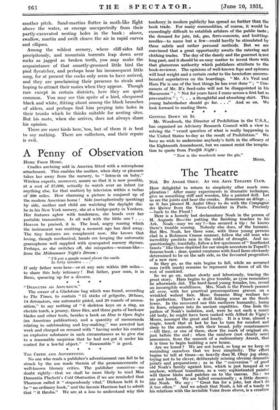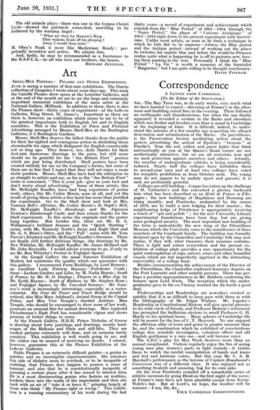The Theatre
Not. BY ANDB.E OBEY. AT THE ARTS THEATRE CLUB.
How delightful to return to simplicity after much com- plication ! After many experiments in dramatic technique,
give us something stiff and wooden, like a painted doll. Let us see the joints and hear the creaks. Remontons au deluge.. . as it has pleased M. Andre Obey to do with the Compagnie des Quinze from the Vieux-Colombier in Paris. Precisely —back to the Flood !
Here is a homely but declamatory Noah in the person of M. Auguste Bootrio putting the finishing touches to his Ark. Noah—may we say ?—has secured a tip : he knows there's trouble coming. Nobody else does, of the humans. But Mrs. Noah, her three sons, with three young persons clad in a Robinson Crusoe manner, follow the old man who incredibly predicts rain in the midst of drought. And un- questioningly, trustfully, follow a few specimens of " fourfooted beasts " like those depicted for our simple ancestors in Topsell's famous book : dear, quaint creatures with fixed faces obviously determined to be on the safe side, as the favoured progenitors of a new race.
In they go, as the rain begins to fall, while an accursed man (with mask) remains to represent the doom of all the rest of mankind.
So we go on, rather slowly and laboriously, tracing the great story. Ham begins to give trouble, as (you remember) he afterwards did. The hard-faced young females, too, reveal an incorrigible worldliness. Mrs. Noah is the French peasant all over, with her practical preoccupations graven on a wrinkled walnut face. Mme. Suzanne Bing realizes her to perfection. - There's a droll fishing scene as the floods lower. In the recovered sun this mediocre humanity, losing its fears, relapses into its ancient cupidities. One feels the pathos of Noah's isolation, and, were he not such a comic old body, he might have been ranked with Alfred de Vigny's Moses, amongst the great and lonely. It is a true, almost a tragic, touch that at last he has to turn for comfort and sleep to the animals, with their broad, jolly countenances —till they, or one of them, show the mark of original sin, just before the end ; when the rainbow (not clearly seen) announces, from the summit of a rudimentary Ararat, that it is time to begin building a new house. Are we bored ? We are not bored, so long as we keep on reminding ourselves that we love simplicity. The effort begins • to tell at times—so heavily does M. Obey jog • along, trying not- to be clever, deliberately missing obvious dramatic points and preparations - as in the " conversion " of good old Noah's family against him, which is just lumped at us anyhow, without transition, as a very sophisticated painter will throw blobs and patches on to the canvas. No : we are not bored. We are lulled occasionally ; a little drowsy, like Noah. We say : " Great fun for a joke, but don't do it too often." And we admit that Noah, a bit of a toady in his relations with the invisible Voice from above, is a creation
bothered by the warning Angel : Cycle—showed the patriarch somnolent, unwilling to be The old miracle plays—there was one in the Corpus Christi What art thou for Heaven's King - -That wakens Noah off his sleeping.? Away I would thou went."
M. Obey's Noah is more like Masterman Ready : per- petually inventive and active. We admire him. And, lastly, he may be recommended as a forerunner to the E.S.P.C.A.—to all who love our brothers, the beasts.
RICHARD JENNINGS.











































 Previous page
Previous page